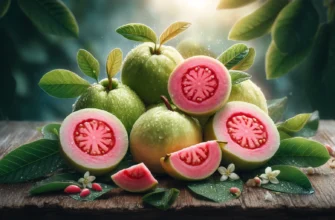Who hasn’t indulged in the sweet, juicy embrace of a watermelon on a scorching summer day? This fruit, though humbly composed of 92% water, is a veritable powerhouse of nutrients and joy, posing a philosophical quandary – is it more a drink than a food? Let us then delve into this delicious enigma, exploring the bountiful benefits of watermelon, a fruit that not only quenches thirst but also invigorates the spirit with its playful presence.

- 10 Benefits of Reveling in Watermelon
- A Hydration Powerhouse
- Dieter’s Delight
- A Cornucopia of Vitamins
- Champion of Heart Health
- Gentle on the Gut
- Soother of Sore Muscles
- Dermatologist’s Dream
- The Anti-Inflammatory Firefighter
- A Foe of Cancer
- Pure, Unadulterated Fun
- 10 Juicy Facts About Watermelon
- Summary: The Watermelon Wonders Never Cease
- FAQ (Frequently Asked Questions About Watermelon)
- What happens if I eat watermelon everyday?
- Is watermelon too high in sugar?
- Is watermelon OK to eat at night?
- Is it OK to eat watermelon seeds?
10 Benefits of Reveling in Watermelon
A Hydration Powerhouse
Amidst the sweltering heat, where the very air you breathe feels like a wool blanket, watermelon emerges as a hydrating savior. With its refreshing water content, it quenches thirst with an efficacy that rivals the most refreshing of drinks, ensuring that your body stays hydrated as effortlessly as floating down a cool stream.
Dieter’s Delight
Watermelon is a beacon for those navigating the caloric tempests of dieting. It offers a sweet reprieve without the burden of excessive calories – like enjoying a fluffy cloud, only infinitely sweeter and without any perplexing meteorological implications.
A Cornucopia of Vitamins
Rich in vitamins A, B6, and C, watermelon acts like a nutritional treasure trove. These vitamins don’t just fortify your immune system; they launch a full-scale defense against the marauding ailments that dare encroach upon your health – scurvy, beware!
Champion of Heart Health
The citrulline in watermelon doesn’t just whisper sweet nothings to your heart; it sings operatic arias, improving circulation and reducing hypertension. This amino acid is a maestro, orchestrating a symphony of heart health that keeps your cardiovascular system in applause-worthy condition.
Gentle on the Gut
Watermelon doesn’t just nourish; it aids in digestion, thanks to its fiber and water composition. It’s the unsung hero of the gastrointestinal opera, performing a delicate ballet that keeps your digestive system pirouetting smoothly.
Soother of Sore Muscles
Watermelon is akin to a muscle whisperer, with citrulline easing muscle soreness post-exertion. Imagine it as a gentle masseuse for your aching limbs, offering a respite that soothes and restores without uttering a single word.
Dermatologist’s Dream
The vitamin A found in watermelon doesn’t just repair skin – it rejuvenates it, encouraging cell growth and making your skin glow with the vigor of a thousand suns. It’s the secret behind why those who eat watermelon often skip the foundation.
The Anti-Inflammatory Firefighter
With its rich lycopene content, watermelon combats inflammation like a firefighter tackles flames. This powerful antioxidant doesn’t just fight inflammation; it prevents it, ensuring that your body remains a temple of health, untouched by the fires of inflammation.
A Foe of Cancer
The same lycopene that battles inflammation also takes up arms against certain cancers. Eating watermelon isn’t just enjoyable; it’s akin to donning armor against the formidable foe of disease, guarding your health with each succulent bite.
Pure, Unadulterated Fun
From seed-spitting contests to fruit carvings, watermelon isn’t just food; it’s an icon of summer fun. It invites laughter and joy to the table, making each bite a celebration of life’s simpler pleasures.
10 Juicy Facts About Watermelon
- Watermelon straddles the botanical line between fruit and vegetable and claims kinship with cucumbers and pumpkins.
- The heaviest watermelon tipped the scales at a whopping 159 kg (350.5 lbs), making it a literal heavyweight in the produce aisle.
- Its vibrant red hue comes from lycopene, the health-promoting antioxidant also found in tomatoes.
- Historical records show that early explorers used watermelons as natural canteens.
- Watermelons were first harvested in Egypt, documented in paintings in ancient tombs.
- The world boasts over 1,200 varieties of watermelon, each with its unique taste and texture.
- China leads the global production of watermelons, cultivating more of this fruit than any other country.
- In Japan, watermelons are sometimes grown into square shapes for decorative purposes, not for consumption.
- Some Mediterranean cultures pickle the rind, turning it into a sought-after delicacy.
- Every part of the watermelon, from seed to rind, is edible, offering a zero-waste option for the eco-conscious consumer.
Summary: The Watermelon Wonders Never Cease
Watermelon is not just a fruit; it’s a multi-faceted marvel that delights the senses, nourishes the body, and embodies the essence of summer. Whether it’s in the depth of philosophical musings or the height of nutritional value, watermelon stands as a testament to the simple joys of life – each slice a celebration, each bite a revelation. So next time you delve into this juicy delight, remember, you’re savoring more than just a fruit; you’re enjoying a slice of life itself. Let the celebration of watermelon continue unabated!
FAQ (Frequently Asked Questions About Watermelon)
What happens if I eat watermelon everyday?
Munching on watermelon daily could make you the life of the hydration party! Packed with water and nutrients, it’s almost like giving your body a mini spa day, every day. Regular consumption can boost hydration, provide you with vitamins A and C, and offer a good dose of antioxidants. Just remember, though, that moderation is key–too much of this good thing, and you might find yourself running to the bathroom more often than you’d like!
Is watermelon too high in sugar?
While watermelon does contain sugar, it’s not the villain in a sugar-laden horror story. It has natural sugars, yes, but it’s also low in calories and high in water content, making it a refreshingly sweet option that won’t cause sugar spikes as more concentrated sweets might. Think of it as nature’s dessert–sweet enough to satisfy but not so much that you’ll need a nap afterward.
Is watermelon OK to eat at night?
Eating watermelon at night isn’t a nocturnal no-go. In fact, its high water content and essential nutrients can be quite refreshing. However, because it’s a diuretic thanks to its high water and potassium content, you might want to consider how close to bedtime you indulge, unless you’re okay with midnight trips to the bathroom interrupting your dreams about beach vacations.
Is it OK to eat watermelon seeds?
Yes, eating watermelon seeds is perfectly fine, and contrary to the old wives’ tale, no, a watermelon won’t grow in your stomach if you do. These tiny seeds are not only safe to eat but are also packed with iron, zinc, and protein. If you’re feeling adventurous, you can even roast them for a crunchy snack. Just maybe don’t use them as a pizza topping–we haven’t reached that level of culinary innovation just yet!







